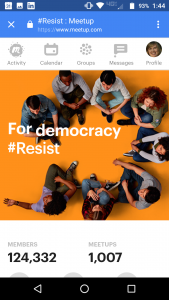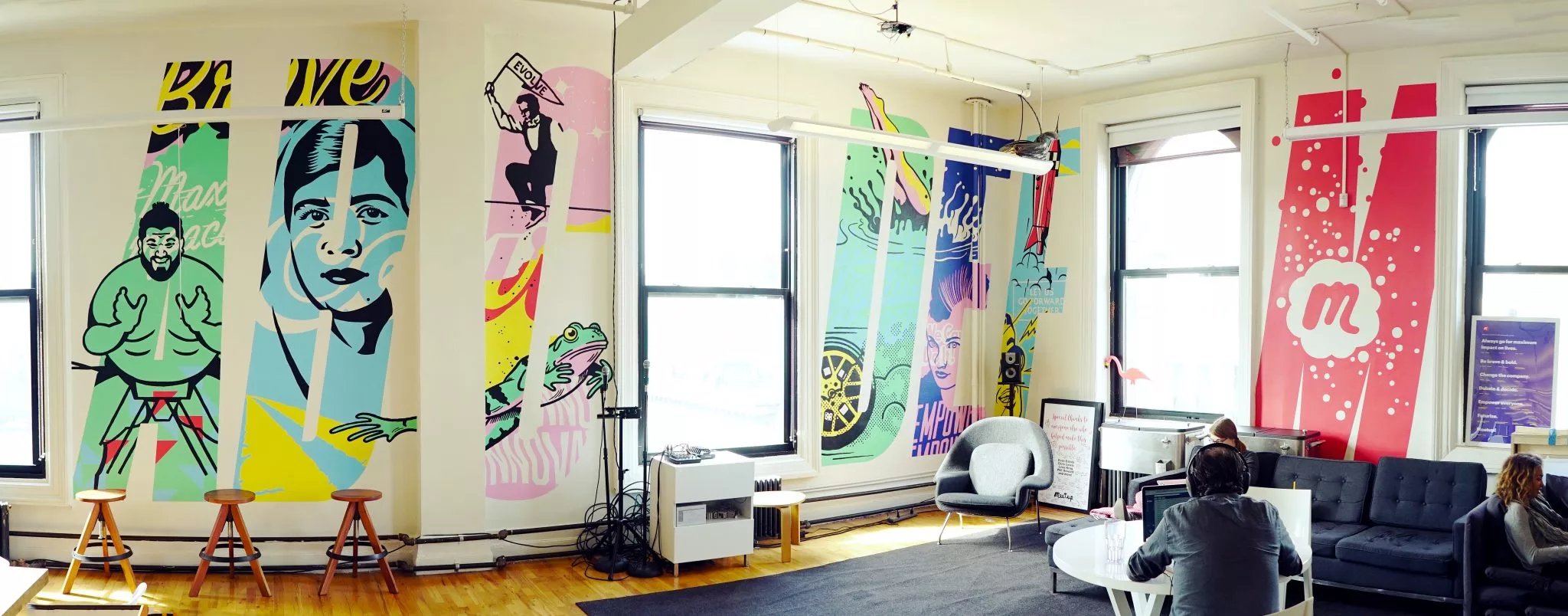Meetup has always been about community. Launched in the wake of the 9/11 terrorist attacks, the online platform allows individuals to organize groups and in-person events around topics of their choice, from comic books to dog breeds to hiking. And, of course, politics and activism. Yet, until 2017, the company had always left the organizing to its members.
All that changed on January 27, 2017, when President Donald Trump signed an executive order banning citizens from six Middle Eastern countries from entering the US. As protests erupted across the country, Meetup took a stand of its own. Within a week, the company had created and launched more than 1,000 #Resist Meetup groups with a mission “to bring people together to act in our neighborhoods on the values essential to democracy, like equality, human rights, social justice, and sustainability.” Unlike typical Meetup groups, which have designated organizers who pay a fee for using the platform, the #Resist Meetup groups are free and any member can host an event. By April 2017, the #Resist Meetup groups comprised 120,000 members in 50 US states and multiple countries, and had hosted more than 20,000 events.
We spoke with Meetup’s communications director, Kristin Hodgson, to learn more about how the company decided to take a political stand and what they’ve learned from the experience.
MEETUP AT A GLANCE
Employees: 175
Location: New York, NY
Founded: 2002
Traction: Nearly 300,000 groups on the platform
Mission: “Meetup brings people together in thousands of cities to do more of what
they want to do in life.”
INTERVIEW
How did Meetup decide to get involved in this kind of advocacy?
Kristin Hodgson: We didn’t take the decision to do this lightly. Meetup has never taken a political stance before, and it has always been core for Meetup to aim to bridge divides, to create community among people who share interests but might have different perspectives. Today, as ever, we welcome well-meaning conservatives as well as well-meaning Democrats. To come out in a way that was on one side of the ideological divide was a real departure for us. So, of course there was a vigorous debate before we went forward.
The spark that motivated us was the first travel ban the Trump administration issued. It was not our intention to wake up that week and take this kind of partisan action. Ultimately, we decided that the right thing to do was to use the power of our platform to help people meet up. We also felt as though the ban crossed a line that had to do with our values.
What are those values that the travel ban crossed?
KH: Meetup works because people are open to strangers. We stand for creating welcoming spaces for people. This ban was all about blocking people on the basis of nationality and religion. Meetup wouldn’t work if people didn’t trust each other and open themselves to strangers. So, in a very fundamental way, it felt like our values were being stepped on. We made this call that we had to leverage our platform to do what we could to fight for the other side. If people were upset about that, as they were, we accepted that and didn’t let it prevent us from taking action.
What was the behind-the-scenes story of how you decided to start these #Resist groups?
KH: On the Monday after the ban was announced, our CEO held two sessions that were open to the entire company. Probably two dozen employees participated in those roundtables to brainstorm ways that Meetup might get involved.
After polling the company, it turned into a leadership-level discussion about whether or not to proceed. Tuesday, the directors made the call to go forward. On Thursday and Friday, we held a company-wide hackathon, which we called a “Resist-a-thon.” We basically stopped operations for two days. The entire company — engineering, product, design, all the functions — worked together to launch these 1,000 groups and to add a bit of extra functionality that would make it so that the groups were free, that anyone within the group could schedule an event, and to make it really easy for us to distribute actions from partners we were bringing on, including Planned Parenthood, the Women’s March, Amnesty International, the ADL, and others. All this work happened in a really short period. The company was making a choice to invest all its resources in this direction.

Meetup’s New York offices, where the company stopped operations for two days to create its #Resist groups.
What’s the continuing investment to keep it functioning now that it’s built?
KH: We’re in the platform business. We make the tool. We’re not in the business of actually running meetups, and so we recognized that to give this a real chance at making its full impact, we needed to bring in people with different kinds of expertise. Meetup has hired, on a temporary, contract basis, Jessica Morales Rocketto and Ashley Kroetsch to help us make these groups as successful and impactful as they can be. They are community organizers. They are political organizers. They’re some of the best around.
The plan all along was for us to transition this network to another partner, person, entity, organization that is philosophically aligned, that can run over the long haul. Just because we started them, we don’t want to hold them. That is part of what Jess and Ashley’s work is — the unusual assignment of taking this network that we’ve kicked off and finding a good home and a good steward who can take it forward on a permanent basis.
Has there been any surprising or notable reaction from within the company to Meetup taking this stance?

Meetup launched special #Resist groups after President Donald Trump’s January 2017 travel ban.
KH: There are probably a handful of employees who might have preferred that Meetup stay neutral, as we have in the past. When you get to be 175 people, you do have employees who have a variety of political viewpoints.
The management realized some might not agree with the political direction we were taking. If this was something that didn’t speak to your values or you had concerns with, you didn’t have to participate . But to my knowledge, nobody stepped out for ideological reasons, and my sense is that this was a source of great pride for employees, to work at a place that was willing to take such a bold stance and to feel like we were part of the solution.
What has the response been from your customers or audience to the company getting involved in activism in this way? Have you seen results yet?
KH: We launched these groups, people joined them, and people are actively scheduling and showing up for resistance activities. So, in the most meaningful way, our members are responding really positively to these groups. We’ve seen 20,500 events so far.
That’s a lot of events in a month.
KH: Right, exactly. Each of those events is not like a march or a protest that’s going to have millions of people show up. It might be 10 people gathering in a coffee shop. But mobilizing people in real life in their local communities is what Meetup does best, and that is the unique contribution that our platform has to make in this moment.
Let’s hear about any negative response you’ve had.
KH: There was a week or two close to when we first launched the initiative where we did hear a lot of complaints from members who are, I assume, supporters of Donald Trump or who otherwise just felt like we had gone too far in taking a political stance. And on social media, there were calls to boycott Meetup. There were some heated tweets that came our way.
What’s giving you hope?
KH: Just the way people are showing up. It’s so inspiring to see how motivated people are, and the ingenuity of the actions they’re taking. I feel like there’s more elbow grease in our political process and in civic issues than has been applied in my lifetime. We’re living through a difficult moment, but I’m hopeful that this level of engagement is something we’ll sustain and will lead to better outcomes in the future. Photo: Meetup
Kristin Hodgon’s Top 3 Lessons for Taking a Stand
1. Be willing to be bold.
The moment that we’re living in requires it, and it’s going to take boldness of leadership to preserve basic democratic American values that we hold dear — not just in our individual lives as citizens, but also operating from our positions of power inside companies.
2. Get your employees invested.
This is a best practice whenever you’re launching a new initiative. Make sure that there’s a shared vision and a shared sense of ownership for the outcome across all levels of the company. What was really, really special in this instance was how the entire company banded together and turned on a dime to make this thing happen. It turned out to be, for many involved, a really great team-building experience.
3. Act for real impact.
In setting this up, it was important not to just do something that was lip service or brand-building for Meetup, but to take action that was actually going to address the real need and the real issue at hand. People across the country wanted to get involved, but they weren’t exactly sure how, they weren’t exactly sure what actions to take, and they were seeking different ways to organize. We had a platform that addressed that key need, which made it possible to go for a really impactful solution. No matter what business you’re in, you know your assets. So think carefully about what you’re going to do that’s going to actually move things forward in an important way.





